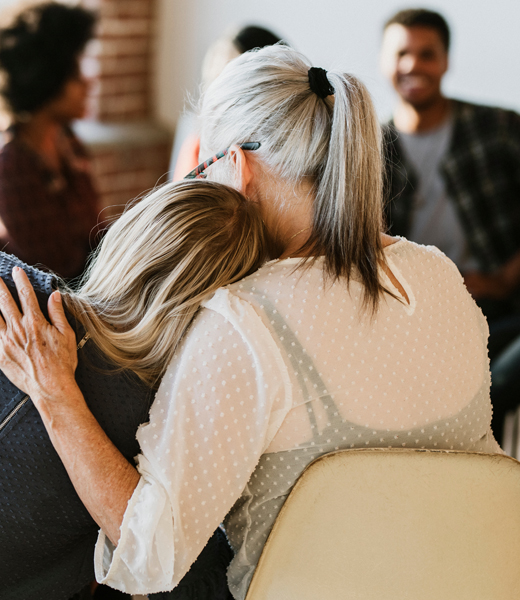Grief Support Groups
Milford Grief Support Groups
How you grieve is influenced by a variety of things, such as your personality and ways of coping, your life experience, your religious beliefs, and the importance of the loss to you.

Grief Group
Why is it necessary to grieve before moving on?
In Milford, we have a Grief Support Group Facilitator waiting to take your call.
The grief process is a normal and natural reaction to loss. It refers to the variety of feelings, ideas, and behaviors that people go through as they come to terms with their loss and begin to heal. While everyone's mourning journey is unique, it usually consists of numerous stages or phases;
Denial; The first stage of mourning is generally characterized by shock and disbelief. Individuals in Milford may have difficulty accepting their loss and may feel numb or alienated from reality.
Individuals may experience rage or frustration as the reality of the loss begins to seep in. This can make you upset with other people, feel like you're being treated unfairly, or feel helpless.
Bargaining; At this point, people may try to make a deal with themselves or a higher force to stop or reverse the loss.Making pledges or attempting to modify particular behaviors or beliefs may be involved.
Depression; As the loss becomes more evident, people may experience feelings of sadness, hopelessness, or hopelessness.They may become withdrawn or secluded, and they may struggle with daily activities.
Acceptance; This stage entails accepting the reality of the loss and beginning to adjust to life without the person or object that was lost. While acceptance does not imply that the pain is completely addressed, it can be a significant step toward healing.
It is crucial to remember that the grief process is not linear, and people may wander between stages or experience some stages more deeply than others. Furthermore, the length of time it takes to proceed through the grieving process varies greatly depending on factors such as the nature of the loss, the individual's personality and coping strategies, and the level of support available. Seeking help from friends, family, or a professional in Milford can help you manage your sorrow and discover a route to healing.
Grief Groups in the Milford Area
A Milford grieving support group can be an invaluable resource after the loss of a loved one. People who have suffered similar losses can talk freely and openly with one another in these types of groups. The support groups are moderated by one of the group leaders or a facilitator who has received YANA-specific training.
At YANA, we talk about the many different options for bereavement support groups.
Anyone in Milford who has lost a spouse, child, parent, sibling, friend, pet, or any other kind of loved one is welcome to attend these gatherings.
Specialized grief support groups may be helpful for people who have lost a parent, spouse, or kid.
There are several online grief support groups available to anyone with internet connection who has experienced a loss. They don't even have to leave the house to accomplish it!
The fourth type of grief support group meets in religious buildings such churches, synagogues, and mosques. People in the Milford area have a place to go where they may open up about the spiritual aspects of their loss without fear of judgment.
Youth support groups; These groups are designed specifically for the needs of young people, giving them a place to feel comfortable opening up about their feelings of loss and finding solace in the company of peers.
The LGBTQ+ community, veterans, and people who have suffered a major loss all have access to specialized support groups.
Those in Milford who are experiencing loss can find support at YANA. Choosing a group that feels natural together is quite important.
Supporting our Milford members through the grieving process; What's Normal Grief?
Please complete the YANA form if you or someone you know needs assistance in the Milford area dealing with traumatic sorrow.
Normal sorrow is a normal and healthy response to a significant loss, like the death of a loved one or the dissolution of a significant relationship. It is a difficult process that involves a range of feelings, ideas, and physical sensations. Common indications of normal grief include-
1. Extreme melancholy, emptiness, and loneliness
2. Rage and impatience
3. Guilt or remorse 3. Focusing issues and poor judgment
4. Changes in appetite, sleep habits, or energy levels
5. Numbness or shock
6. Strong feelings brought on by thoughts of the loss
7. A longing for someone or something that has passed away.
Even though normal sorrow can be a difficult and painful process, it is an essential step in the healing process. It's crucial to give yourself permission to experience your emotions and express them in healthy ways, such as writing in a journal, speaking with a dependable friend or family member, or seeking professional assistance. It's crucial to look after yourself during this time by getting enough sleep, eating well, and engaging in activities that make you feel at ease and happy. but there is no defined timetable for grieving, most people eventually manage to feel some kind of acceptance and tranquility, but the specific date and process varies from person to person.
If you are facing a loss in your life in Milford, YANA facilitators are here to help
If you're going through a tough time in your life, YANA is a warm and welcoming community that will help you get through it. You can get help from others around you when you grieve.
Grief is a complicated and multidimensional sensation that can express in a variety of ways. Some examples of common types of grief are-
Normal Grief; This is the natural reaction to the loss of a loved one or a big life change. It is characterized by a variety of feelings such as despair, anger, guilt, and disbelief and can last for a different amount of time.
Complicated grieving; This type of grieving is more severe and persistent than typical grief, and it can interfere with daily life. It is marked by persistent feelings of sadness, emptiness, and longing for the deceased, as well as difficulties embracing the loss and moving on.
Anticipatory grieving; This type of grieving comes when people anticipate the loss of a loved one or a significant life change. It might show as despair, anxiety, and stress, and it frequently results in emotional detachment.
Disenfranchised grieving; This type of grieving occurs when a person believes that their loss is not being acknowledged or validated by others. This can occur when someone loses a pet or a non-traditional relationship, for example.It might cause feelings of loneliness and be difficult to articulate or process.
Cumulative grieving; This type of grieving occurs when someone suffer several losses in a short period of time, such as the deaths of several family members or friends. It might cause feelings of overwhelm and emotional weariness.
It's vital to remember that everyone grieves differently, and there is no "right" way to grieve. It is critical to respect your personal experience and seek help when necessary.
Do you anticipate suffering a tragic loss soon?
No of the type of loss you are experiencing, YANA is here to help you feel less anguish. By taking part in our grief support group and absorbing our lessons, you can find peace.
A form of sadness known as disenfranchised grief is one that society doesn't openly acknowledge or support. When someone in Milford experiences a significant loss that is not acknowledged or validated by others who are close to them, it occurs. This form of loss could be the passing of a pet or the loss of a loved one who overdosed, committed suicide, or was HIV/AIDS positive.
Disenfranchised grief can manifest as a number of symptoms, including-
1. Feelings of isolation or loneliness
2. Having trouble understanding or expressing feelings associated with bereavement
3. Having problems asking for help from close friends, family, or the community.4. Anxiety over being misunderstood or criticized by others.
5. Angry or irritated that society has not recognized or validated the loss.
6. Having trouble moving past a loss or obtaining closure as a result of it
People who don't feel as though their loss is being heard or isn't significant enough to warrant acknowledgment may find it difficult to grieve.However, it's critical to acknowledge and accept these emotions since they are a normal and healthy way to process loss.Exercises for self-care and building relationships with others in Milford who have had analogous losses can also be helpful in managing imprisoned grief. By recognizing and expressing these emotions, people may achieve closure and begin to move past their losses.
At YANA, you are never alone, regardless of the loss you are experiencing in Milford. Dealing with Complex Grief.
Please fill out the YANA webform to get in touch with our grief support group counselors in Milford if you need immediate help with a complex loss.
Complex sadness is a form of grief that is more acute, lasts longer than regular mourning, and can cause disruptions in daily living. It is marked by ongoing sadness, emptiness, and yearning for the deceased, as well as difficulty accepting and getting over the loss.
The following are some of the most frequent indications of difficult grieving-
1. Prolonged, severe, and hopeless sadness, sorrow, or depression
2. A challenge moving on and accepting the loss.
3. Beliefs that the loss was unjustified or denied
4. Having a hard time experiencing joy
5. Trouble maintaining ties with others
6. Staying away from scenarios that make you think about your loss or make you feel sad.
7. A strong fixation on the deceased or a broken relationship
8. Having trouble with routine tasks or obligations
Complex sadness can result from a variety of situations, including sudden or unexpected loss, violent or traumatic death, a tumultuous or difficult relationship with the deceased, or a lack of support or resources during the mourning process.It is imperative that you get support if you are showing signs of complicated grief since this type of loss can affect your daily functioning and physical well-being. Depending on the severity of the symptoms and what each person needs, complicated mourning in Milford can be handled with therapy, support groups, or medication.
We Help People with Comulative Grief
We in Milford are very sorry for all the loss and sadness you've been through in such a short time. Just know that we are here for you if you are going through more than one loss, like losing a job, stopping a relationship, losing a loved one, or having more than one family member or friend pass on.
Here are some common signs of grief that builds up over time-
1. Feelings of being heavy, tired, or burned out
2. Not being able to fully understand or feel the feelings that come with each loss.
3. Having a hard time finding joy or pleasure in everyday things
4. Having trouble figuring out what life is about or why it's worth living.
5. Trouble sleeping or changes in eating.
6. Not caring about people or relationships
7. Can't pay attention or make decisions
8. The feeling of being emotionally distant or numb
When we talk to our Milford members about cumulative sadness, we bring up how they feel like they are always losing things. But it's important to understand and accept these feelings because they are a normal and healthy way to deal with loss. People can get peace and start to get over their losses by getting help from others in Milford who have been through similar things and by working through their feelings through things like going to work.
Milford News On Family Crisis
Milford, ct: 58.77F Clear Sky
Best Online Grief Counseling Services of 2024 â Forbes Health Forbes
Media project gives families outlet to help process grief of losing a child University Times
October 7 orphans' healing trip saved; flight found Israel Hayom
11 Best Online Therapy Companies for Grief Counseling, Tried and Tested Verywell Mind
Perspectives on grief and loss American Counseling Association
How To Cope With Grief While Hustling As Per A Psychiatrist Onlymyhealth
The Grieving Process Davenport Family Funeral Homes and Crematory
Nurturing children through grief, with help from Elmo and his cousin, Jesse APA Psychology News
My 3-Year-Old Began Saying These 3 Devastating Words To Strangers. I Wasn't Prepared For What Happened Next. HuffPost
Local Support Group Launches For Grieving Parents KBND
A Way Forward: How to Navigate Grief Kettering Health
7 Books on Grief, Loss and Bereavement The New York Times
Taylor Swift Is Embracing the 5 Stages of Grief. Should You? TIME
Advice | What grief does to your brain, and how to cope with it The Washington Post
Untangling trauma and grief after loss American Counseling Association
The Stages Of Grief: How To Cope With Loss â Forbes Health Forbes
Opinion | After I Lost My Son, I Realized I Needed to Stop Looking for Closure The New York Times
Losing A Parent: How To Cope With The Grief â Forbes Health Forbes
Anticipatory Grief: Symptoms and How To Cope Health Essentials
Group Grief Counseling: Benefits and How To Find It Health.com
Adding grief to NJ school curriculum? NJ Spotlight News
Healthy Grieving and DÃa de los Muertos Right as Rain by UW Medicine
BHS and Soul 57 provide students with group grief counseling KFYR
Unresolved Grief is Eating Away at Us The Hastings Center
Statewide: Helping children process grief NPR Illinois
Podcast: Beyond Five Stages: Rethinking Grief with Krista St-Germain PsychCentral.com
E46: The Emotional Domain of Grief University of Utah Health Care
5 Stages of Grief, According to a Trauma Therapist Parade Magazine
Easing the Toll of Long-Distance Grief YES! Magazine
Bereavement process considered at Scott County Schools Spectrum News 1
Make Waves For Mental Health And A Better Future theorangetimes.com
Bridges to help more students with trauma in Milford, West Haven Milford Mirror
NAMI CT in need of volunteers to expand its mental health programming CT Insider
Man killed by Connecticut state trooper was having mental health problems, witnesses testify NBC Connecticut
West Haven Marking Mental Health Awareness Month With May 1 Kickoff Event Patch
Man killed by CT state trooper struggled with mental health, family says at trial New Hampshire Public Radio
Northwest CT gets 'competitive' grant for teen mental health care The Connecticut Mirror
HamletHub HamletHub
Coastal Connecticut Counseling moves into vacant Milford office building Milford Mirror
New Milford man charged with killing mother in park dies in prison Danbury News Times
5 Bridgeport Nonprofits Receive State Capital Improvement Grants Patch
HamletHub HamletHub
New Milford schools brings mental health services 'where the students are' through on-campus centers CT Insider
Milford United Way Plan To Expand Roster Of Charitable Organizations Patch
HamletHub HamletHub
New CT law allows students to take mental health days Milford Mirror
HamletHub HamletHub
Brookfield Mental Health Counselor Sentenced After Defrauding Medicaid Patch
Local Environmentalist Uses Knowledge To Empower New Milford Youth Patch
New Milford program to support middle schoolers' mental health CT Insider
Sherman resident opens health collaborative in New Milford: 'a focus on health and healing' CT Insider
New survey finds alarming data on children's mental health in CT CT Insider
Milford adds eight counselors for student emotional support Milford Mirror
Milford practice specializes in treatment-resistant depression Milford Mirror
Judge Overturns Deal To Allow Teen Treatment Facilities In Fairfield Patch
HamletHub HamletHub
Obituary: Kathleen D. Golden, 76, Of Milford | Milford, CT Patch Patch
What's Opening In New Milford? A Look At New Businesses Patch
Southern Professor, Grad Student Win National AMHCA Awards Patch
Latest New Businesses Registered In Milford | Milford, CT Patch Patch
Let's Talk
You will receive a 15 minute phone call from our group leader, as an introduction to the program and to discuss suitability. This is free and without obligation.


















